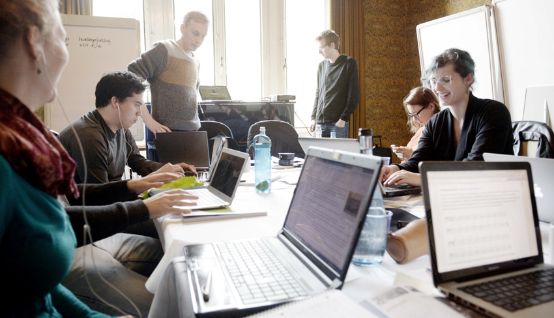Pilots for the public
Since last year, the Heidelberger Frühling has been offering an academy for music journalism. Report from the 2016 edition with seasoned professionals such as Eleonore Büning and Max Nyffeler and a number of young intrepid journalists.

The notebooks are open. The coffee pot moves from table to table. The deadline for the first Heidelberg Spring festival journal is four hours away. "Now the chit-chat of the last few days is over," says Eleonore Büning, music editor of the Frankfurter Allgemeine Zeitung (FAZ), and has a review projected onto the screen in the Robert Schumann Room of the Stadthalle. The ten-day Academy of Music Journalism under her direction is only taking place for the second time this year. The eight places are awarded to young music journalists who have already published and are actively involved in music. This year's participants include two singers and a cellist, an organist and Anna Lang, who plays six different instruments. Thilo Braun studies music journalism in Dortmund and works as a freelancer for cultural radio station WDR3. His review of a concert by violinist Tianwa Yang with pianist Nicholas Rimmer the previous evening is collectively edited. It's all about a good introduction, the right balance ("You mustn't over-spice the texts!"), the resolution of relative clauses and, time and again, the right, precise wording. "When I think of 'slipping away', I think of a slimy affair," Büning states dryly and looks for alternatives together with the academy fellows. They work on the sentence for ten minutes. "Delicate lilting tones from Yang's violin contrasted with the rumble of the afterbeats in the piano" is the final version, which can be read in the festival journal the next day.
Plea for the profession
"Today, every newspaper finds greater distribution through music critics," wrote Georg Kreisler in the 1960s. And defined the job description in his wicked song: "One of my duties as a music critic is to destroy beauty." Today, music criticism is marginalized in newspapers. The texts are becoming shorter and less frequent. In editorial conferences, people speak disparagingly of review graveyards and special interest texts, which nobody reads anyway because of the subject matter and technical vocabulary. The fact is that never before has so much classical music been heard in concert halls, festivals and opera houses as at present. According to a study by the Society for Consumer Research, classical events (concerts, operas, operettas) already had more visitors than pop concerts and musicals in Germany in 2011. So what is in crisis is not classical music, but music journalism, according to the Heidelberg Spring program book. "For me, good music criticism is the best way of communicating music," says Artistic Director Thorsten Schmidt. "Music critics are guides for the audience. Writing about music helps people talk about it." That's why he founded the Academy of Music Journalism in 2015. And in Eleonore Büning (64), he has recruited perhaps the most important music critic in Germany. She also experienced the decline in reporting on classical music at the Frankfurter Allgemeine Zeitung. Until 2004 there were still four music editors, but since 2012 she has been the only person responsible for classical music. "Content is geared towards quotas, chatter replaces competence, advertising replaces discourse," she writes in the editorial of the Akademiejournal. The economic pressure on newspapers is high due to the migration of the advertising business to the Internet, a process she sees as "unstoppable and irreversible". At the Music Journalism Academy, Büning wants to prepare the participants for the future. Particular attention is paid to online journalism. Storyboards are created for longer texts that also incorporate audio samples. Your own website www.musik-journalismus.com last year's two scholarship holders, Christopher Warmuth and Malte Hemmerich, have given the building a new tile design.
In general, the eight young music journalists don't fit the cliché of the dispassionate critic caricatured by Georg Kreisler ("I have no idea what music is, because I'm a pharmacist for a living. But I know very well what criticism is: the worse it is, the happier people are"). There are no oddball classical music nerds at the Music Journalism Academy, but communicative digital natives whose enthusiasm for music can be felt at every moment. They listen with interest and ask questions when Swiss music journalist Max Nyffeler (born in 1941) talks about his experiences and the difficult economic conditions. "On the radio in particular, there has been an extreme decline in broadcasting slots for reports dealing with classical and, above all, contemporary music in recent years. Fees have been halved or in some cases quartered. And things are no better at the newspapers." However, young music journalists like Anna Lang (23) from Karlsruhe are not deterred by this. They want to cover a wide range of topics and serve both radio and print. They can't get rich with music journalism - the scholarship holders are aware of that. But they are passionate about what they do. Despite all the objections, Max Nyffeler also makes a plea for the profession at the end of his statement: "Opening people's ears, teaching them to understand and enabling communication is the most important task of the music critic."








